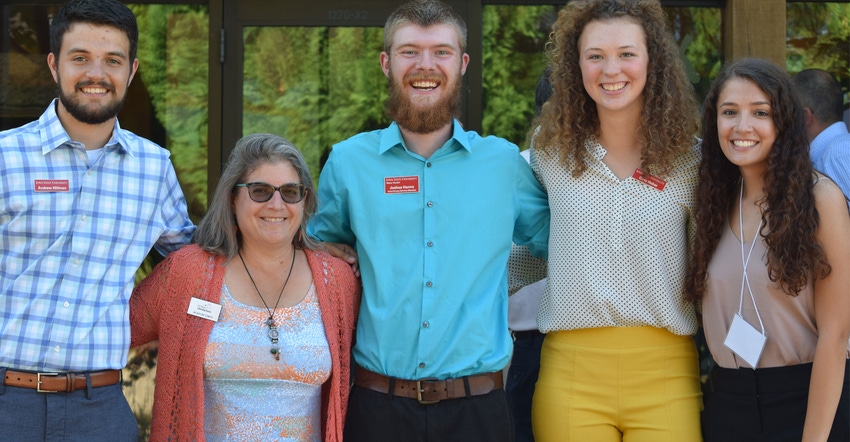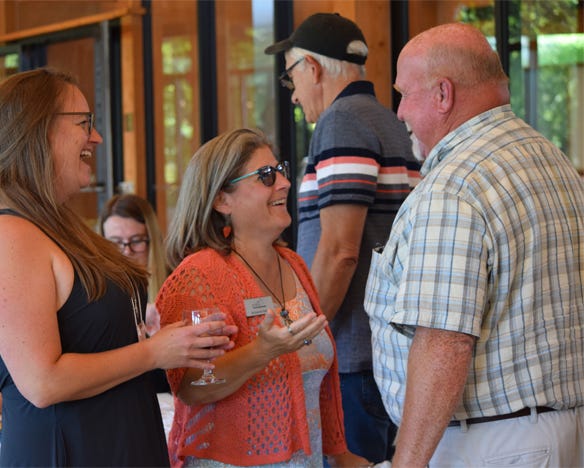September 27, 2019

Iowa Learning Farms, the award-winning statewide conservation and water quality education and outreach program at Iowa State University, celebrates 15 years of service to Iowa this year.
Established in 2004, ILF is building a “culture of conservation” by encouraging adoption of conservation practices. Farmers, researchers and ILF team members are working together to identify and implement the best management practices that improve water quality and soil health while remaining profitable.
Jackie Comito
ILF Director Jackie Comito joined ILF in 2005, soon after it was formed, and has continued to be a key leader and contributor to the program ever since. She brings a strong background in social science that influenced the development and growth of the program’s highly successful evaluation and feedback initiatives.
As director of ILF, how do you see your role within the organization? As ILF has grown over the past 15 years, my roles and responsibilities have changed, but fundamentally, I like to think the most important part of my job is to help ensure the organization stays true to what has made us successful — emphasis on farmer-to-farmer outreach to put information and best practices in front of those who can make the best use of them.
Sometimes I’m a cheerleader and coach; other times I facilitate brainstorming and conversations among team members to continue to develop and expand the vision for ILF. In addition, I do my upmost to make sure we are effectively and efficiently reaching as many farmers as we can.
As an organization, we need to continue to grow and improve how we support farmer conservation implementation. This is where a robust evaluation program really helps; it provides a positive feedback loop that fosters ideas and energy for our efforts to help build a culture of conservation in tangible ways.
Evaluation and feedback are priorities for ILF. How do you see this part of the program evolving over the next five to 15 years? Evaluation is an organic thing. It must come out of what you are doing with programming. If it’s an integral part of the planning process, program and evaluation are seamless elements that support each other.
For example, when we were building our recently launched Emerging Farmers program, we included evaluation and feedback in the mix from the beginning. We used these tools to fine-tune the program to the unanticipated and evolving needs of participants. This approach helps us deliver more value to our participants more quickly.
How important is youth outreach — such as the Water Rocks! program — to making progress on conservation, water quality improvement and the nutrient reduction goals for Iowa? It’s incredibly important. While our concentration on working with farmers is crucial to making progress today and in the near term, working with farmers we are really playing the short game.
With youth we are playing the long game. We are planting seeds with these young people about conservation, water quality and what they can do individually to have an impact. When they become decision-making adults, our hope is they will have a solid framework and environmental ethic that puts environmental challenges and solutions in the forefront of their thoughts and actions.
In addressing today’s youth, we are speaking with the future scientists and inventors. Not only are we providing education, we feel as though we are modeling career opportunities in science and research.

COMMITED TO CONSERVATION: Jackie Comito (center), director of the Iowa Learning Farms program, says, “ILF has made a difference in natural resource protection in Iowa, and we look forward to continuing to change, grow and help increase adoption of conservation practices that lead to better protection of our state’s natural resources.”

If you had to choose two, what are the most impactful achievements or lessons learned from the first 15 years of ILF, and how do they inform the path going forward? Field days. We’ve developed an excellent process for organizing, promoting and operating field days that works for everyone involved, and take a lot of pressure of the host farmer or organization. Field day programs are crucial to facilitating farmer-to-farmer conversations and influence.
The Conservation Station trailers have also been a significant achievement for ILF. Designing and redesigning these mobile classrooms across the years has kept materials fresh, enabled us to respond to feedback, and draw audiences to learn about conservation, farming practices and water quality. Utilizing the trailers at public venues such as county fairs, farmers markets and community gatherings, we’ve been incredibly successful in taking the conservation message to the public.
How do you see the next five years of ILF evolving? We are not going to sit on our laurels with field days; we hope to continually expand the quantity and topics for these important events. We would also like to build a fourth Conservation Station trailer with an emphasis on wetlands education.
ILF will continue to be a strong voice providing education and advocacy for conservation practices at venues from field days to classroom programs. There is no end in sight for the need to continually reinforce the challenges facing Iowa and provide information and education through outreach programs such as ILF.
What are your fondest memories of working with ILF? The relationships I’ve formed with colleagues and people throughout the state are very special to me. I’ve particularly enjoyed getting to know many farmers and learning about farming processes, challenges and conservation efforts.
Even if there are long periods between meetings, when I get a chance to see them, it’s like seeing an old friend. Relationships and community are essential to the success of ILF, and we are striving to make the most of advocates across Iowa to help build a culture of conservation that will benefit all.
If you could look 15 years into the future, what one thing would you like to see as a result of ILF activities? My hope for the future of Iowa includes a substantial increase in the number of wetlands. I would love to be a part of finding a solution and resources to make a reality of the goal to take 3% to 4% of cropland out of production and return it to prairie and wetlands.
You May Also Like




